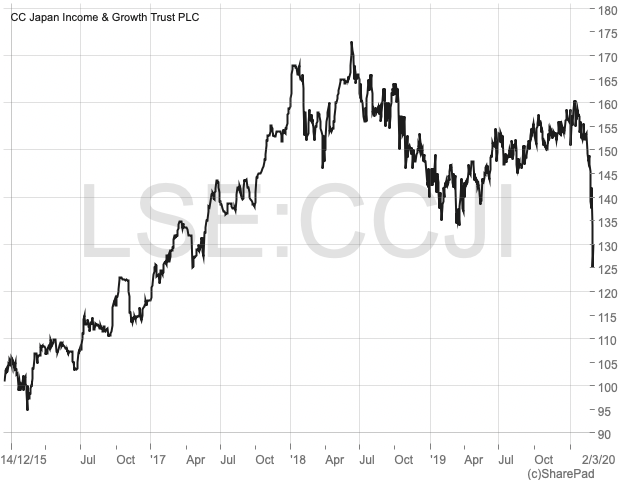The best funds to invest in Japan

| Master Investor Magazine
Never miss an issue of Master Investor Magazine – sign-up now for free! |
With Japan being a top pick for 2020 among the professionals, Nick Sudbury unearths some of the best funds and trusts for investing in the Land of the Rising Sun.
Japan is one of the most favoured markets for 2020, with many advisors including the country in their top picks for the year. Despite long-established concerns over the high national debt and low rate of inflation, there are good reasons to believe that the local stock market will continue to deliver decent returns for investors.
Shinzō Abe has recently become Japan’s longest-serving prime minister and during his tenure has implemented a radical series of economic policies that have become known as Abenomics. The ‘three arrows’ of monetary easing, fiscal stimulus and structural reforms were designed to inject some life into the moribund economy, and they have made a considerable difference, although it is still a work in progress.
Commenting on the Japanese economy’s state of transition, as implementation of the prime minister’s long-running reform programme continues, Ryan Hughes, head of active portfolios at AJ Bell, says:
“The recent rise in consumption tax has the ability to dent progress in 2020, but with the Olympic Games likely to bring a big summer boost, the tax rise could well pass off relatively uneventfully.”
The key to the country’s prospects over the next 12 months will be the health of China, which is an important trading partner. If there is a positive conclusion to the US-China trade war, then Japan would be one of the major beneficiaries.
Attractive valuations
According to Ben Yearsley, a director at Shore Financial Planning: “Investors should ignore the demographic problem of the ageing population as there is still money to be made in some excellent companies.”
Darius McDermott, managing director of Chelsea Financial Services, is also positive on Japan, commenting that: “Corporate governance is improving and dividends are growing, which is great news for income investors. It’s also a market that is less well covered than most and that means active managers can really add value, especially if they are willing to do their research in the small and mid-cap space.”
Valuations are towards the bottom end of the range and the region should benefit as the global economy recovers from its slump of 2019 and exports grow again, although the country faces some long-term challenges, as Adrian Lowcock, head of personal investing at Willis Owen observes:
“Japan has long suffered from deflation and anaemic growth and its companies have struggled with an ageing population.
“This has left it unpopular with investors; however the country has been undergoing a lot of reform and it has also done much to address its labour system, making it easier for women and foreign workers to enter the workforce, which should help support the economy.”
Currency risk
Before investing it is important to decide whether or not to hedge the currency risk. This is quite easy to do as many of the open-ended Japanese funds are available in both hedged and unhedged share classes. Commenting on hedging decisions, McDermott says:
“The pound is cheap relative to its long-term history and we can see a scenario for it appreciating strongly, but also a scenario where it dips again or stays lower for longer. In our managed funds we have decided to opt for a 50:50 split between hedged and unhedged share classes.”
The problem is that the currency markets are a potentially volatile and dangerous place to try to make predications, especially given that the trade discussions between the UK and the EU are likely to cause volatility in sterling throughout the year:
“As it stands, I see no compelling case to hedge Japanese exposure and a look at last year shows just how costly getting it wrong can be with a 13% swing both down and up in the GBP/yen exchange rate over the past 12 months,” notes Hughes.
The best open-ended funds
According to data from FE Trustnet, there are 70 open-ended funds operating in the Japan sector and over the last five years they have generated an average gain of 74.4%. The best of the lot with an impressive cumulative return of 190% was Legg Mason IF Japan Equity X. Commenting on the fund, Yearsley says: “It tends to invest in much smaller companies and is higher risk, so if you feel comfortable with this sort of profile you need to treat it as a long-term buy and hold.”
| Master Investor Magazine
Never miss an issue of Master Investor Magazine – sign-up now for free! |
He also likes Man GLG Japan Core Alpha, which is run by Stephen Harker, a contrarian investor who looks for companies that are out of favour. The fund buys into the cheapest companies listed in Japan, often using the price-to-book metric, with the manager happy to move around the different sectors depending on where the value is. Lowcock also likes it, pointing out that: “Harker uses a rigorous, repeatable process that draws on the team’s extensive knowledge of the Japanese market. With the clear focus on value, long-term investment horizon and no consideration for the benchmark, the portfolio will differ from the index.”
Baillie Gifford
One of the most highly regarded investment groups operating in the region is Baillie Gifford, which runs a number of successful open-ended funds and investment trusts.
Yearsley’s favourite is Baillie Gifford Japanese, which like most of the firm’s other funds buys into long-term growth companies. It has a good track record and is ranked eighth in the sector over the last five years, with a return of 101.2%.
McDermott prefers Baillie Gifford Japanese Income Growth, which aims to take advantage of the growth in dividends in the country. It has returned 27.7% over three years and is yielding a higher than average 2.2%.
The fund is co-managed by Karen See and Matt Brett, who are supported by nine other Japan specialists, each with sector-research responsibilities. Lowcock is also a fan, commenting: “Baillie Gifford has a collegiate approach and all ideas are debated by the team. Careful stock selection is paramount and the managers also consider industry trends and themes such as technology and demographics. The focus is on companies with strong balance sheets and a commitment to growing dividends.”
Baillie Gifford Japanese Smaller Companies is the top-performing fund in the Smaller Japanese Companies sector, with a five-year return of 142.8%. The seven constituents have produced an average gain of 102.5% over the same period.
Other options
Other decent options include Comgest Growth Japan, which McDermott says has a long-term focus, with the manager picking a few really good quality companies and investing in them for many years. The fund is the third-best performer in the sector over five years, with a gain of 135.1%.
Lowcock prefers Lindsell Train Japanese Equity, which is managed by Michael Lindsell, who has specialised in Japanese equities since he first started covering them in 1985. Lowcock says:
“Lindsell’s investment philosophy lies in the belief that a highly concentrated portfolio of high-quality, cash-generative, strong, and easily understood business franchises will outperform the market and reduce volatility over the long term.”
Lindsell uses strict criteria aligned to this belief to significantly filter down the universe to 80 or 90 qualifying stocks that are then subject to in-depth fundamental analysis. The fund will typically underperform in strongly rising markets, yet his unwavering adherence to the investment philosophy has resulted in considerable long-term success.
For smaller-company exposure McDermott suggests AXA Framlington Japan. “It invests in companies of all sizes, but has about a 60% allocation to the mid and small caps and is investing in the automation and robotics themes, which are important to the country to help it cope with the ageing population.”
The best investment trusts
Data from Winterflood shows that there are six investment trusts operating in this area and over the last five years, they have generated a weighted average share-price return of 104%, which is well ahead of the 76% gain from the large-cap TSE First Section benchmark.
The best performer over this period was the £295m Fidelity Japan Trust (LON:FJV) with an increase of 151%. Despite the strong returns, the sector as a whole is trading at an average discount to net asset value (NAV) of five percent.
JPMorgan Japanese (LON:JFJ) is the largest investment trust in the sector with total assets of £974m. It has been managed out of Tokyo since 2007 with lead manager Nicholas Weindling, supported by a well-resourced team that enables him to follow a bottom-up, stock-picking strategy.
They have developed a thematic approach that underlies much of their stock selection with the key areas of interest including internet, Japanese brands, automation and improving corporate governance. It is a growth-oriented portfolio that has delivered strong long-term returns, yet the shares are available on a nine percent discount, which is one of the widest in the sector.
| Master Investor Magazine
Never miss an issue of Master Investor Magazine – sign-up now for free! |
There are also four smaller-companies investment trusts that have generated an average five-year gain of 151%. Leading the way is the £555m Baillie Gifford Shin Nippon (LON:BGS) with an impressive return of 198%.
BGS was launched in July 1985 and has been managed by Praveen Kumar and a nine-strong support team since December 2015. Kumar aims to identify small Japanese stocks with above-average prospects for capital growth and looks to hold them for at least three to five years. The fund has an excellent long-term track record and normally trades at a small premium.
Funds targeting the corporate governance reforms
One of the newest and most unusual investment trusts in the sector is the £134m AVI Japan Opportunity Trust (LON:AJOT), which aims to exploit improvements in corporate governance by investing in a concentrated portfolio of small and mid-cap Japanese stocks.
Japan is unusual in that there are some large cross-shareholdings between certain companies that can result in bloated balance sheets with lots of cash and minimal investor scrutiny. Under President Abe’s policy of structural reforms, this poor corporate governance is starting to change, with businesses having to focus more on shareholder returns.
AJOT aims to profit from this trend by adopting a ’friendly activism’ approach, by giving companies an extra nudge in the right direction. This now seems to be paying off with 11 of its 28 holdings announcing share buybacks in the last year and two of its positions moving from being part-owned by Toshiba to fully owned at a large premium to their previous share prices.
A second investment trust is also planning to follow a similar approach. At time of writing, the Nippon Active Value Fund was hoping to raise £200m to take minority stakes in a concentrated portfolio of up to 20 holdings in undervalued Japanese equities. The manager intends to focus on stocks where cash constitutes a significant proportion of the market cap and where the company has no controlling or majority shareholders.
Many Japanese companies are available at attractive valuations and the structural reforms should help to improve shareholder returns. In the past, the country has mainly been of interest to those looking for capital growth, but the increased focus on dividends could make it a decent option for income investors.
FUND OF THE MONTH
One of the big themes in Japan is the move towards companies becoming more shareholder friendly. This is having an impact on a number of different areas, including the payment of dividends:
“Dividends are becoming a bigger part of the market and dividend-growth prospects look attractive, especially as companies are sitting on large cash piles with 2019 dividends hitting record levels,” says Hughes:
“The pay-out ratio remains at a low base, giving significant scope for year-on-year increases, which could make this market very interesting for income seekers.”
He therefore recommends the £257m Coupland Cardiff Japan Income & Growth Trust (LON:CCJI). Like all investment trusts it has flexibility on its income policy, being able to add to its revenue reserves in good years and draw on them in bad years, thereby delivering consistent dividend growth over time.
CCJI has a concentrated portfolio of 42 different holdings with 35 held for their dividend growth, five for their stable yield and two special situations. The fund is yielding 2.5% and over the last three years has returned 37%, which is almost double the MSCI Japan index. The shares are trading close to NAV.


Comments (0)